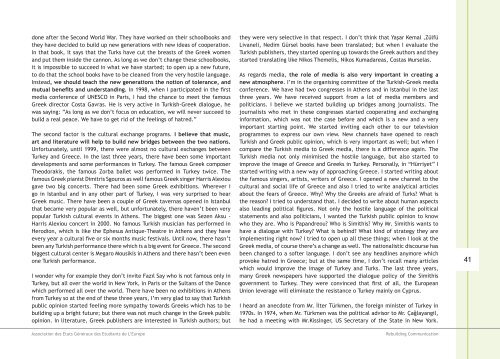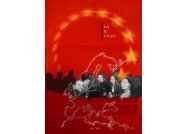turkish-greek civic dialogue - AEGEE Europe
turkish-greek civic dialogue - AEGEE Europe
turkish-greek civic dialogue - AEGEE Europe
Create successful ePaper yourself
Turn your PDF publications into a flip-book with our unique Google optimized e-Paper software.
done after the Second World War. They have worked on their schoolbooks and<br />
they have decided to build up new generations with new ideas of cooperation.<br />
In that book, it says that the Turks have cut the breasts of the Greek women<br />
and put them inside the cannon. As long as we don’t change these schoolbooks,<br />
it is impossible to succeed in what we have started; to open up a new future,<br />
to do that the school books have to be cleaned from the very hostile language.<br />
Instead, we should teach the new generations the notion of tolerance, and<br />
mutual benefits and understanding. In 1998, when I participated in the first<br />
media conference of UNESCO in Paris, I had the chance to meet the famous<br />
Greek director Costa Gavras. He is very active in Turkish-Greek <strong>dialogue</strong>, he<br />
was saying: ”As long as we don’t focus on education, we will never succeed to<br />
build a real peace. We have to get rid of the feelings of hatred.”<br />
The second factor is the cultural exchange programs. I believe that music,<br />
art and literature will help to build new bridges between the two nations.<br />
Unfortunately, until 1999, there were almost no cultural exchanges between<br />
Turkey and Greece. In the last three years, there have been some important<br />
developments and some performances in Turkey. The famous Greek composer<br />
Theodorakis, the famous Zorba ballet was performed in Turkey twice. The<br />
famous Greek pianist Dimitris Sgouros as well famous Greek singer Harris Alexiou<br />
gave two big concerts. There had been some Greek exhibitions. Wherever I<br />
go in Istanbul and in any other part of Turkey, I was very surprised to hear<br />
Greek music. There have been a couple of Greek tavernas opened in Istanbul<br />
that became very popular as well, but unfortunately, there haven’t been very<br />
popular Turkish cultural events in Athens. The biggest one was Sezen Aksu -<br />
Harris Alexiou concert in 2000. No famous Turkish musician has performed in<br />
Herodion, which is like the Ephesus Antique-Theatre in Athens and they have<br />
every year a cultural five or six months music festivals. Until now, there hasn’t<br />
been any Turkish performance there which is a big event for Greece. The second<br />
biggest cultural center is Megaro Mousikis in Athens and there hasn’t been even<br />
one Turkish performance.<br />
I wonder why for example they don’t invite Fazıl Say who is not famous only in<br />
Turkey, but all over the world in New York, in Paris or the Sultans of the Dance<br />
which performed all over the world. There have been no exhibitions in Athens<br />
from Turkey so at the end of these three years, I’m very glad to say that Turkish<br />
public opinion started feeling more sympathy towards Greeks which has to be<br />
building up a bright future; but there was not much change in the Greek public<br />
opinion. In literature, Greek publishers are interested in Turkish authors; but<br />
Association des Etats Généraux des Etudiants de L’<strong>Europe</strong><br />
they were very selective in that respect. I don’t think that Yaşar Kemal ,Zülfü<br />
Livaneli, Nedim Gürsel books have been translated; but when I evaluate the<br />
Turkish publishers, they started opening up towards the Greek authors and they<br />
started translating like Nikos Themelis, Nikos Kumadareas, Costas Murselas.<br />
As regards media, the role of media is also very important in creating a<br />
new atmosphere. I’m in the organising committee of the Turkish-Greek media<br />
conference. We have had two congresses in Athens and in Istanbul in the last<br />
three years. We have received support from a lot of media members and<br />
politicians. I believe we started building up bridges among journalists. The<br />
journalists who met in these congresses started cooperating and exchanging<br />
information, which was not the case before and which is a new and a very<br />
important starting point. We started inviting each other to our television<br />
programmes to express our own view. New channels have opened to reach<br />
Turkish and Greek public opinion, which is very important as well; but when I<br />
compare the Turkish media to Greek media, there is a difference again. The<br />
Turkish media not only minimised the hostile language, but also started to<br />
improve the image of Greece and Greeks in Turkey. Personally, in “Hürriyet” I<br />
started writing with a new way of approaching Greece. I started writing about<br />
the famous singers, artists, writers of Greece. I opened a new channel to the<br />
cultural and social life of Greece and also I tried to write analytical articles<br />
about the fears of Greece. Why? Why the Greeks are afraid of Turks? What is<br />
the reason? I tried to understand that. I decided to write about human aspects<br />
also leading political figures. Not only the hostile language of the political<br />
statements and also politicians, I wanted the Turkish public opinion to know<br />
who they are. Who is Papandreou? Who is Simithis? Why Mr. Simithis wants to<br />
have a <strong>dialogue</strong> with Turkey? What is behind? What kind of strategy they are<br />
implementing right now? I tried to open up all these things; when I look at the<br />
Greek media, of course there’s a change as well. The nationalistic discourse has<br />
been changed to a softer language. I don’t see any headlines anymore which<br />
provoke hatred in Greece; but at the same time, I don’t recall many articles<br />
which would improve the image of Turkey and Turks. The last three years,<br />
many Greek newspapers have supported the <strong>dialogue</strong> policy of the Simithis<br />
government to Turkey. They were convinced that first of all, the <strong>Europe</strong>an<br />
Union leverage will eliminate the resistance o Turkey mainly on Cyprus.<br />
I heard an anecdote from Mr. İlter Türkmen, the foreign minister of Turkey in<br />
1970s. In 1974, when Mr. Türkmen was the political advisor to Mr. Çağlayangil,<br />
he had a meeting with Mr.Kissinger, US Secretary of the State in New York.<br />
Rebuilding Communication<br />
41







